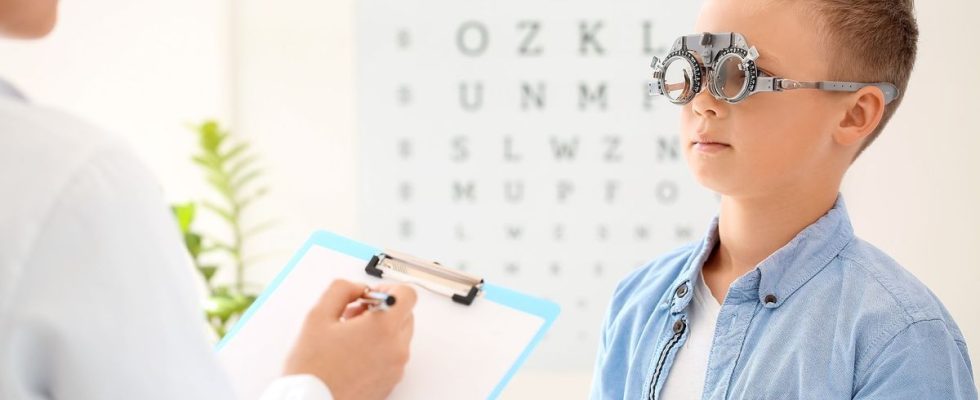Published on
Updated
Reading 3 mins.
According to a clinical trial, a daily drop of atropine, in low doses, in each eye could slow the progression of myopia in children. Good news when you know that progressive myopia affects more than 500,000 children in France.
A simple treatment to slow the progression of myopia in children and avoid glasses? This will soon be possible, according to an American study conducted over three years, and published on June 1st. A drop of atropine (the drug used to dilate the pupils), very low dose, would inhibit the lengthening of the eye in question in myopic children aged 6 to 10 years.
Myopia in children: what are the risks?
Myopia is a very common pathology. About one in three adults in the world is myopic, and the global prevalence of myopia is expected to reach 50% by 2050. According to estimates by the Haute Autorité de Santé in 2022, in France 510,000 children aged 6 to 15 would be with progressive myopia and 1,347,969 with non-progressive myopia. With particularities:
- In prevalence, this represents an average of 23.7% of children aged 6 to 15;
- Girls are more affected than boys (26.7% vs. 20.9%);
If myopia is not a serious disease, it can however engage risks over the years and in adulthood when it evolves from childhood. This elongation of the eye leading to myopia which begins in young children, continues to worsen in adolescence before stabilizing in most people.
But in addition to requiring lifelong vision correction, myopia increases the risk of retinal detachment, macular degeneration, cataracts and glaucoma later in life. “The idea of keeping eyeballs smaller with these drops is not only to keep glasses thin, but also to avoid that at 70 these people do not suffer from visual impairment”, said Karla Zadnik, lead author of the study and professor and dean of the College of Optometry at Ohio State University.
A single drop of solution at bedtime, for a marked improvement
The results of the CHAMP (Childhood Atropine for Myopia Progression) trial were therefore published on June 1. This new, double-blind, randomized Phase 3 trial evaluated the safety and efficacy of two low-dose solutions, with atropine concentrations of 0.01% or 0.02%, compared to placebo. The treatment for each of the 489 children aged 6 to 10 years assessed was one drop per eye daily at bedtime, which minimized the disruption of blurring effects that atropine might have on vision. Medication safety was assessed in a larger sample of 573 participants that also included children 3 to 16 years old.
The researchers were a little surprised to find that the most significant improvements at all time points compared to the placebo resulted from the solution containing 0.01% atropine. Although the 0.02% atropine formulation was also more effective in slowing the progression of myopia than placebo, the results were less consistent.
“The 0.01% story is clearer and more evident in terms of a significant slowing in both eye growth, and a decrease in eyeglass prescription“, Zadnik said.
In a second part of the trial, the researchers are currently evaluating how the eyes react when the treatment is finished. The investigational drug is made without preservatives and, if federally approved as a therapy, would be distributed in single-use packaging for convenience and to avoid contamination.
“This is probably the future of myopia care”
For Dr. Clémence Bonnet, ophthalmologist in Paris, this option is undoubtedly about to revolutionize the management of myopia in children, which is currently a public health problem. “This study also responds to another Chinese study conducted on thousands of children with the same result, proving that this is probably the future of child care.”
To the point of surpassing other existing solutions, such as glasses of course, but also contact lenses or surgery? The professional does not see any common measures: “CThese solutions exist, but have a significant cost that patients cannot necessarily afford. So, yes, if a drop of atropine a day can solve the problem, it seems very effective, and it’s also very attractive.”
